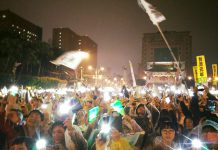
But even after becoming a national, she would still have to wait 10 years before she could officially stand for election in Taiwan. Apart from casting her first vote, Lisa wants to highlight how immigrants’ right to be elected is restricted and is considering running in the next election to raise awareness of the issue.
Unlike the immigrants married to Taiwanese, some blue-collar workers, mainly working in menial and dangerous jobs, or as domestic workers, can never become R.O.C. nationals and can only stay in Taiwan for a maximum of 12 years. There were 587,940 such migrants in December, 2015.
The Taiwan International Workers’ Association (TIWA) has advocated for migrant workers’ rights since 1999. Its researcher Wu Jing-ru says the lack of translations of information about government’s services and current affairs, and long working hours prevent blue-collar workers from understanding Taiwan society, let alone participate in politics.
Wu believes migrant workers should have voting rights even if they are not citizens because labour policies strongly affect them. “Regardless of whether they are white-collar or blue-collar workers, it is ridiculous that migrants have no right to express their opinion in labour issues,” says Wu.
Foreigners’ voting rights in Taiwan are an issue of human rights, but it has received little attention worldwide. Wu explains that Taiwan is not a member of the United Nations. Therefore, it is not monitored by the UN or bound by the relevant international conventions.
In cooperation with other pressure groups, TIWA has organised large-scale protests every two years since 2003 to draw the attention of political parties and the general public on migrant rights. “People used to think that migrant workers steal their jobs, but their mindset is changing,” she says.
She has noticed that more workers are willing to join the protests in recent years and says recent rallies have targeted the DPP, as the likely ruling party after the January election.

Photo courtesy of TIWA
Despite the change in government, National Chengchi University’s Bruce Liao does not expect any changes on voting rights for non-nationals in the short term. He says that as a comparatively nativist party, the DPP is unlikely to treat it as a priority, especially with many pressing economic and trading issues needing attention. However, Liao does not think the issue will backslide either because the DPP is seeking ways to boost the economy. He explains that attracting and keeping more overseas professionals and business people can help to enhance the economy’s competitiveness. This may be a possible factor for the DPP to review foreigners’ voting rights in the long run.
Public opinion will also play a major part. “In 2000, Taiwanese are quite hostile to foreigners,” Liao says. “But in the recent ten years, citizens begin to view them positively and the government will gradually change its stance.”









































